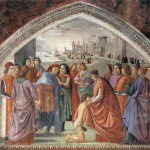![The Temptation of Saint Anthony by Henri Fantin-Latour [Public domain], via Wikimedia Commons](https://wp-media.patheos.com/blogs/sites/637/2017/04/Fantin_Latour_The_Temptation_of_St_Anthony-300x228.jpg)
He said also, “He who wishes to live in solitude in the desert is delivered from three conflicts: hearing, speech, and sight; there is only one conflict for him and that is with fornication.”[1]
Some of Anthony’s sayings have more direct relevance to those who follow after him into a monastic way of life, but even then, the wisdom which lies behind those sayings can still be adapted to have value for all walks of life. This text is clearly aimed at those who felt a call to the religious life, warning them that while such a way of life might give aid against some temptations, because they will avoid the near occasion of sin, they must not assume that they will likewise find themselves strengthened against all temptations. Religious life must not be overly romanticized. Thus, Anthony explains to those who seek a monastic vocation, going out into the desert, living as a hermit, will not lead them away from all temptation. What the monk has recorded in their mind, what has been seeded in their lives, will come with them into their cell, and it will be something they will have to face as they face the trials and tribulations of spiritual warfare all by themselves.
Anthony understood that temptation does not go away just because someone flees society. The ultimate source of one’s own temptations is found within the people themselves. What memories, habits, and desires they bring with them into the cell will try to sway them away from the path of virtue. The desire for fornication, lust, is seeded deep in the psyche and will not be overturned because someone has fled society. Nor should they assume that if they are not likely speak to, listen to, or see someone whose beauty will incite their lust, they will not face temptation: their minds are seeded with memories which can be used for fantasies, fantasies which will tempt them to sin. Likewise, just because a monk is in the desert, does not mean they will have no human contact, just less of it, and so from time to time, they might meet someone and find the means and opportunity to fall into sin and they might indeed do so if they have not been praying with humility. There are many stories of monks going astray and so returning to a village or a city to copulate, or worse, to attack someone who is living near them, perhaps even another monk, showing how their sexuality was merely repressed and not properly and healthily dealt with.
Anthony himself knew this from his own experience. When he fled into the desert, he faced many temptations, including those dealing with lust. The body has its natural desires, but they must be put into checked, used at the appropriate times and places. Those who are celibate must find a way to deal with and control their sexual desire, to put the body and its inclinations under rational control instead of being imprisoned and checked by them. Sexual desire, indeed, is deeply rooted to body, and it has its proper place and function, which is why it is a good, for it helps in the propagation of humanity and bringing couples together in love; but if someone is called to celibacy, the desires do not vanish, and so must be put under proper spiritual management. Because of its function and place, however, sexual desires will not vanish just because they are celibate; it will give them considerable temptation, and yet, as Anthony was to observe, it is a rather simple and obtuse temptation, capable of being temporarily suppressed by some who engage it through mere repression, or properly being overturned when engaged with proper discipline and understanding. Celibates must see the good which lies with the desire and transform that good through proper order, instead of seeing it all as evil and trying to negate and destroy it, for the second will be impossible but the first will allow for maturity and spiritual growth.












